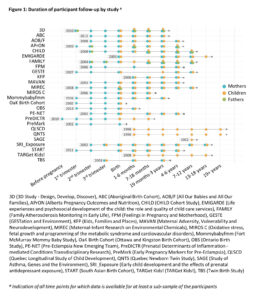The Research Advancement through Cohort Cataloguing and Harmonization (ReACH) initiative aims to leverage research on the Developmental Origins of Health and Disease (DOHaD) by providing the Canadian and international research community with a platform optimising data discoverability and facilitating co-analysis of harmonized data. ReACH implemented a comprehensive web-based catalogue documenting Canadian pregnancy and birth cohorts’ and resources (methods, expertise and open source software) to support investigators interested in harmonizing and co-analyzing data across studies.
Basics, follow-up and attrition of ReACH.
Twenty-six Canadian studies are currently participating to the ReACH initiative. Start years of baseline data collections vary from 1996 to 2016 and the number of participants recruited by individual studies range from 70 to 11 379. Together, studies recruited 34 891 mothers, 45 907 children, 8835 fathers, 30 grandmothers and 264 siblings.
Significant variation is present across studies in duration and frequency of follow-ups (Figure 1). Follow-up duration ranges between 16 months to 24 years, and 20 of the 26 studies are still following participants.
Design and measures.
Participating studies collected questionnaires data, biospecimens, physical measurements, cognitive assessments, and retrieved information from administrative databases. All studies collected information about age, sex, anthropometric measures, and pregnancy and delivery outcomes. Most (>80%) also collected information about tobacco use, breastfeeding, diseases of the circulatory or respiratory systems, visits to health professionals, hospitalizations, medication intake, education, income, residence, ethnicity and psychological distress and emotions.
Unique features.
Participating studies have collected an invaluable amount of data and samples particularly useful to support DOHaD research. A major strength of ReACH is the level of details and standardization offered by the catalogue, combined with the capacity to search and easily extract information to (1) identify existing variables and studies of interest and (2) explore harmonization potential across studies. The catalogue allows one to easily estimate whether data of interest is accessible, might serve to answer the specific research questions addressed (e.g. level of physical activity measured with a specific scale), and is similar enough to enable co-analysis across multiple studies. The catalogue helped implementing projects making use of the study data and will support the documentation of the harmonized data generated, helping investigators to learn from the rules and algorithms used by others, thus improving quality and efficiency of forthcoming data harmonization initiatives.
Reasons to be cautious.
ReACH does not offer access to a central data repository including study-specific and/or harmonized data from all participating studies. The platform was implemented as an adaptable resource aimed at leveraging and supporting discretionary harmonization initiatives.
Collaboration and data access.
The ReACH metadata catalogue (https://www.maelstrom-research.org/network/reach) documents the design and content of the studies, and the potential to access data and samples. Contact information and individual study websites are also provided to inform investigators interested in asking for access to data. The ReACH team (info@maelstrom-research.org) can also be contacted for more information and support.
Funding and competing interests.
This work is supported by the Canadian Institutes of Health Research (CIHR): operating grant for the Canadian DOHaD cohort registry (2016-2021) (OCR-144561) and the Research Institute of the McGill University Health Center. There is no conflict of interest to declare.
Read the full article here.
Authors and affiliations.
Julie Bergeron1, Rachel Massicotte1, Stephanie Atkinson2, Alan Bocking3, William Fraser4, Isabel Fortier1 on behalf of the ReACH member cohorts’ principal investigators

1Research Institute of the McGill University Health Centre, Montreal, Canada; 2McMaster University, Hamilton, Canada; 3University of Toronto, Toronto, Canada; 4Université de Sherbrooke, Sherbrooke, Canada. The complete author list is available in the full version of the profile.

